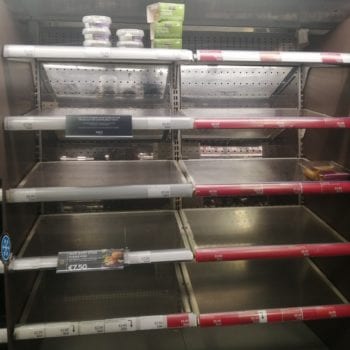Retailers suffering food shortages in the wake of Brexit

Goods travelling between Great Britain and Ireland are now subject to customs checks and red tape
12 January 2021
It’s only two weeks since the Withdrawal Agreement between the UK and the EU was agreed and yet Irish retailers’ worst fears about Brexit are being realised. Already the excess red tape and customs issues have resulted in empty shelves in some supermarkets both north and south of the border.
Twitter has been lighting up with reports of food shortages in M&S stores over the past week. One such tweet read, “Food shelves left bare at Dublin Marks and Spencer store after Brexit. Fridges at the British retailer’s outlet in Dundrum found empty in first week of post-Brexit trading after similar scenes reported in Paris.”
Another Twitter user Kevin O’Ceallaigh said: “We saw the same in the M&S in the Blanchardstown Centre. Many empty shelves. Aldi (which used a lot of Irish produce) was fully stocked next door. For balance, M&S said, “Due to a systems issue, some of our products are unavailable,” but didn’t directly refer to #Brexit.”
As pictures of empty shelves were being posted online a spokesperson for Marks and Spencer told TheJournal.ie that the issue arose because of new processes following Brexit.
“Following the UK’s recent departure from the EU, we are transitioning to new processes and it is taking a little longer for some of our products to reach our stores,” he said. The spokesperson added that the problem is expected to be resolved “soon”.
Although a trade deal between the EU and the UK has averted the imposition of tariffs on food, goods travelling between Great Britain and Ireland are now subject to customs checks and red tape that did not previously exist, which can only mean delays and shortages.
Managing director of Retail Excellence, Duncan Graham has said that M&S is particularly susceptible to facing issues because it sources the vast majority of its products in the UK and transports them to Ireland daily.



 Print
Print






Fans 0
Followers